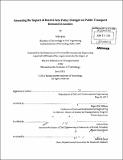Assessing the impact of recent fare policy changes on public transport demand in London
Author(s)
Jain, Nihit
DownloadFull printable version (32.64Mb)
Other Contributors
Massachusetts Institute of Technology. Dept. of Civil and Environmental Engineering.
Advisor
Nigel H.M. Wilson and Jinhua Zhao.
Terms of use
Metadata
Show full item recordAbstract
Public transit agencies across the world have been moving towards electronic ticketing technology and to take advantage of the greater flexibility, have made changes in fare structure. Over the last decade, Transport for London has implemented the Oyster smart card based electronic ticketing system (including the Pay-as-you-Go stored credit payment facility) on the major public transport modes: buses, the Underground and National Rail, and there have also been changes in the fare structure on these modes. This thesis explores the impacts that fare structure and technology changes (known here as fare policy changes) have had on user sensitivity to fares (fare elasticities), ticket usage and demand for travel on public transport modes in London. The first case study uses a log-linear regression model on annual-differenced data to estimate demand on buses and the Underground in London. The findings from this research suggest that London bus and Underground user fare elasticities have not changed significantly since 2000. The implementation of the Oystercard Pay-as-you-Go system increased demand on the Underground, while the effect on buses could not be conclusively estimated. The second case study uses ticket sales and journey data from before and after the implementation of the Oyster electronic ticketing system on National Rail to assess the impact on ticket use, growth in travel and modal switching. The results show that, within 9 months of the implementation, Oystercard Pay-as-you-Go journeys on National Rail tripled, while single or return journeys on paper tickets halved. Further, after controlling for other changes, the electronic ticketing system increased travel on National Rail by around 3%. This increase resulted from growth in public transport travel and possibly from switching from other public transport modes. This research is of value to policy makers in public transport agencies since it suggests that electronic ticketing systems, if implemented properly, may increase public transport demand. The findings also suggest that smart card payment systems offering stored credit and multi-journey passes are preferred by users over less convenient ticket media such as limited paper tickets.
Description
Thesis (S.M. in Transportation)--Massachusetts Institute of Technology, Dept. of Civil and Environmental Engineering, 2011. Cataloged from PDF version of thesis. Includes bibliographical references (p. 170-172).
Date issued
2011Department
Massachusetts Institute of Technology. Department of Civil and Environmental EngineeringPublisher
Massachusetts Institute of Technology
Keywords
Civil and Environmental Engineering.